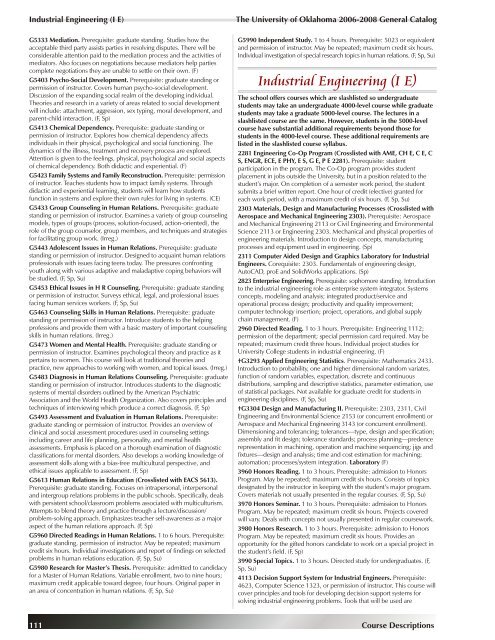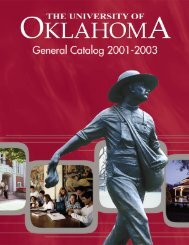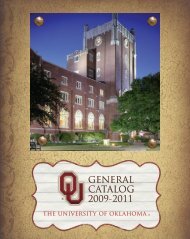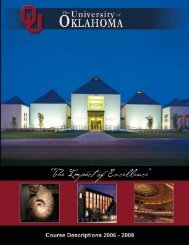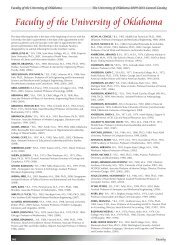ART - Catalog - University of Oklahoma
ART - Catalog - University of Oklahoma
ART - Catalog - University of Oklahoma
You also want an ePaper? Increase the reach of your titles
YUMPU automatically turns print PDFs into web optimized ePapers that Google loves.
Industrial Engineering (I E)<br />
The Uni ver sity <strong>of</strong> <strong>Oklahoma</strong> 2006-2008 Gen eral Cat a log<br />
G5333 Mediation. Prerequisite: graduate standing. Studies how the<br />
acceptable third party assists parties in resolving disputes. There will be<br />
considerable attention paid to the mediation process and the activities <strong>of</strong><br />
mediators. Also focuses on negotiations because mediators help parties<br />
complete negotiations they are unable to settle on their own. (F)<br />
G5403 Psycho-Social Development. Prerequisite: graduate standing or<br />
permission <strong>of</strong> instructor. Covers human psycho-social development.<br />
Discussion <strong>of</strong> the expanding social realm <strong>of</strong> the developing individual.<br />
Theories and research in a variety <strong>of</strong> areas related to social development<br />
will include: attachment, aggression, sex typing, moral development, and<br />
parent-child interaction. (F, Sp)<br />
G5413 Chemical Dependency. Prerequisite: graduate standing or<br />
permission <strong>of</strong> instructor. Explores how chemical dependency affects<br />
individuals in their physical, psychological and social functioning. The<br />
dynamics <strong>of</strong> the illness, treatment and recovery process are explored.<br />
Attention is given to the feelings, physical, psychological and social aspects<br />
<strong>of</strong> chemical dependency. Both didactic and experiential. (F)<br />
G5423 Family Systems and Family Reconstruction. Prerequisite: permission<br />
<strong>of</strong> instructor. Teaches students how to impact family systems. Through<br />
didactic and experiential learning, students will learn how students<br />
function in systems and explore their own rules for living in systems. (CE)<br />
G5433 Group Counseling in Human Relations. Prerequisite: graduate<br />
standing or permission <strong>of</strong> instructor. Examines a variety <strong>of</strong> group counseling<br />
models, types <strong>of</strong> groups (process, solution-focused, action-oriented), the<br />
role <strong>of</strong> the group counselor, group members, and techniques and strategies<br />
for facilitating group work. (Irreg.)<br />
G5443 Adolescent Issues in Human Relations. Prerequisite: graduate<br />
standing or permission <strong>of</strong> instructor. Designed to acquaint human relations<br />
pr<strong>of</strong>essionals with issues facing teens today. The pressures confronting<br />
youth along with various adaptive and maladaptive coping behaviors will<br />
be studied. (F, Sp, Su)<br />
G5453 Ethical Issues in H R Counseling. Prerequisite: graduate standing<br />
or permission <strong>of</strong> instructor. Surveys ethical, legal, and pr<strong>of</strong>essional issues<br />
facing human services workers. (F, Sp, Su)<br />
G5463 Counseling Skills in Human Relations. Prerequisite: graduate<br />
standing or permission <strong>of</strong> instructor. Introduce students to the helping<br />
pr<strong>of</strong>essions and provide them with a basic mastery <strong>of</strong> important counseling<br />
skills in human relations. (Irreg.)<br />
G5473 Women and Mental Health. Prerequisite: graduate standing or<br />
permission <strong>of</strong> instructor. Examines psychological theory and practice as it<br />
pertains to women. This course will look at traditional theories and<br />
practice, new approaches to working with women, and topical issues. (Irreg.)<br />
G5483 Diagnosis in Human Relations Counseling. Prerequisite: graduate<br />
standing or permission <strong>of</strong> instructor. Introduces students to the diagnostic<br />
systems <strong>of</strong> mental disorders outlined by the American Psychiatric<br />
Association and the World Health Organization. Also covers principles and<br />
techniques <strong>of</strong> interviewing which produce a correct diagnosis. (F, Sp)<br />
G5493 Assessment and Evaluation in Human Relations. Prerequisite:<br />
graduate standing or permission <strong>of</strong> instructor. Provides an overview <strong>of</strong><br />
clinical and social assessment procedures used in counseling settings<br />
including career and life planning, personality, and mental health<br />
assessments. Emphasis is placed on a thorough examination <strong>of</strong> diagnostic<br />
classifications for mental disorders. Also develops a working knowledge <strong>of</strong><br />
assessment skills along with a bias-free multicultural perspective, and<br />
ethical issues applicable to assessment. (F, Sp)<br />
G5613 Human Relations in Education (Crosslisted with EACS 5613).<br />
Prerequisite: graduate standing. Focuses on intrapersonal, interpersonal<br />
and intergroup relations problems in the public schools. Specifically, deals<br />
with persistent school/classroom problems associated with multiculturism.<br />
Attempts to blend theory and practice through a lecture/discussion/<br />
problem-solving approach. Emphasizes teacher self-awareness as a major<br />
aspect <strong>of</strong> the human relations approach. (F, Sp)<br />
G5960 Directed Readings in Human Relations. 1 to 6 hours. Prerequisite:<br />
graduate standing, permission <strong>of</strong> instructor. May be repeated; maximum<br />
credit six hours. Individual investigations and report <strong>of</strong> findings on selected<br />
problems in human relations education. (F, Sp, Su)<br />
G5980 Research for Master’s Thesis. Prerequisite: admitted to candidacy<br />
for a Master <strong>of</strong> Human Relations. Variable enrollment, two to nine hours;<br />
maximum credit applicable toward degree, four hours. Original paper in<br />
an area <strong>of</strong> concentration in human relations. (F, Sp, Su)<br />
G5990 Independent Study. 1 to 4 hours. Prerequisite: 5023 or equivalent<br />
and permission <strong>of</strong> instructor. May be repeated; maximum credit six hours.<br />
Individual investigation <strong>of</strong> special research topics in human relations. (F, Sp, Su)<br />
Industrial Engineering (I E)<br />
The school <strong>of</strong>fers courses which are slashlisted so undergraduate<br />
students may take an undergraduate 4000-level course while graduate<br />
students may take a graduate 5000-level course. The lectures in a<br />
slashlisted course are the same. However, students in the 5000-level<br />
course have substantial additional requirements beyond those for<br />
students in the 4000-level course. These additional requirements are<br />
listed in the slashlisted course syllabus.<br />
2281 Engineering Co-Op Program (Crosslisted with AME, CH E, C E, C<br />
S, ENGR, ECE, E PHY, E S, G E, P E 2281). Prerequisite: student<br />
participation in the program. The Co-Op program provides student<br />
placement in jobs outside the <strong>University</strong>, but in a position related to the<br />
student’s major. On completion <strong>of</strong> a semester work period, the student<br />
submits a brief written report. One hour <strong>of</strong> credit (elective) granted for<br />
each work period, with a maximum credit <strong>of</strong> six hours. (F, Sp, Su)<br />
2303 Materials, Design and Manufacturing Processes (Crosslisted with<br />
Aerospace and Mechanical Engineering 2303). Prerequisite: Aerospace<br />
and Mechanical Engineering 2113 or Civil Engineering and Environmental<br />
Science 2113 or Engineering 2303. Mechanical and physical properties <strong>of</strong><br />
engineering materials. Introduction to design concepts, manufacturing<br />
processes and equipment used in engineering. (Sp)<br />
2311 Computer Aided Design and Graphics Laboratory for Industrial<br />
Engineers. Corequisite: 2303. Fundamentals <strong>of</strong> engineering design,<br />
AutoCAD, proE and SolidWorks applications. (Sp)<br />
2823 Enterprise Engineering. Prerequisite: sophomore standing. Introduction<br />
to the industrial engineering role as enterprise system integrator. Systems<br />
concepts, modeling and analysis; integrated product/service and<br />
operational process design; productivity and quality improvement;<br />
computer technology insertion; project, operations, and global supply<br />
chain management. (F)<br />
2960 Directed Reading. 1 to 3 hours. Prerequisite: Engineering 1112;<br />
permission <strong>of</strong> the department; special permission card required. May be<br />
repeated; maximum credit three hours. Individual project studies for<br />
<strong>University</strong> College students in industrial engineering. (F)<br />
†G3293 Applied Engineering Statistics. Prerequisite: Mathematics 2433.<br />
Introduction to probability, one and higher dimensional random variates,<br />
function <strong>of</strong> random variables, expectation, discrete and continuous<br />
distributions, sampling and descriptive statistics, parameter estimation, use<br />
<strong>of</strong> statistical packages. Not available for graduate credit for students in<br />
engineering disciplines. (F, Sp, Su)<br />
†G3304 Design and Manufacturing II. Prerequisite: 2303, 2311, Civil<br />
Engineering and Environmental Science 2153 (or concurrent enrollment) or<br />
Aerospace and Mechanical Engineering 3143 (or concurrent enrollment).<br />
Dimensioning and tolerancing; tolerances—type, design and specification;<br />
assembly and fit design; tolerance standards; process planning—predence<br />
representation in machining, operation and machine sequencing; jigs and<br />
fixtures—design and analysis; time and cost estimation for machining;<br />
automation; processes/system integration. Laboratory (F)<br />
3960 Honors Reading. 1 to 3 hours. Prerequisite: admission to Honors<br />
Program. May be repeated; maximum credit six hours. Consists <strong>of</strong> topics<br />
designated by the instructor in keeping with the student’s major program.<br />
Covers materials not usually presented in the regular courses. (F, Sp, Su)<br />
3970 Honors Seminar. 1 to 3 hours. Prerequisite: admission to Honors<br />
Program. May be repeated; maximum credit six hours. Projects covered<br />
will vary. Deals with concepts not usually presented in regular coursework.<br />
3980 Honors Research. 1 to 3 hours. Prerequisite: admission to Honors<br />
Program. May be repeated; maximum credit six hours. Provides an<br />
opportunity for the gifted honors candidate to work on a special project in<br />
the student’s field. (F, Sp)<br />
3990 Special Topics. 1 to 3 hours. Directed study for undergraduates. (F,<br />
Sp, Su)<br />
4113 Decision Support System for Industrial Engineers. Prerequisite:<br />
4623, Computer Science 1323, or permission <strong>of</strong> instructor. This course will<br />
cover principles and tools for developing decision support systems for<br />
solving industrial engineering problems. Tools that will be used are<br />
111 Course Descriptions


